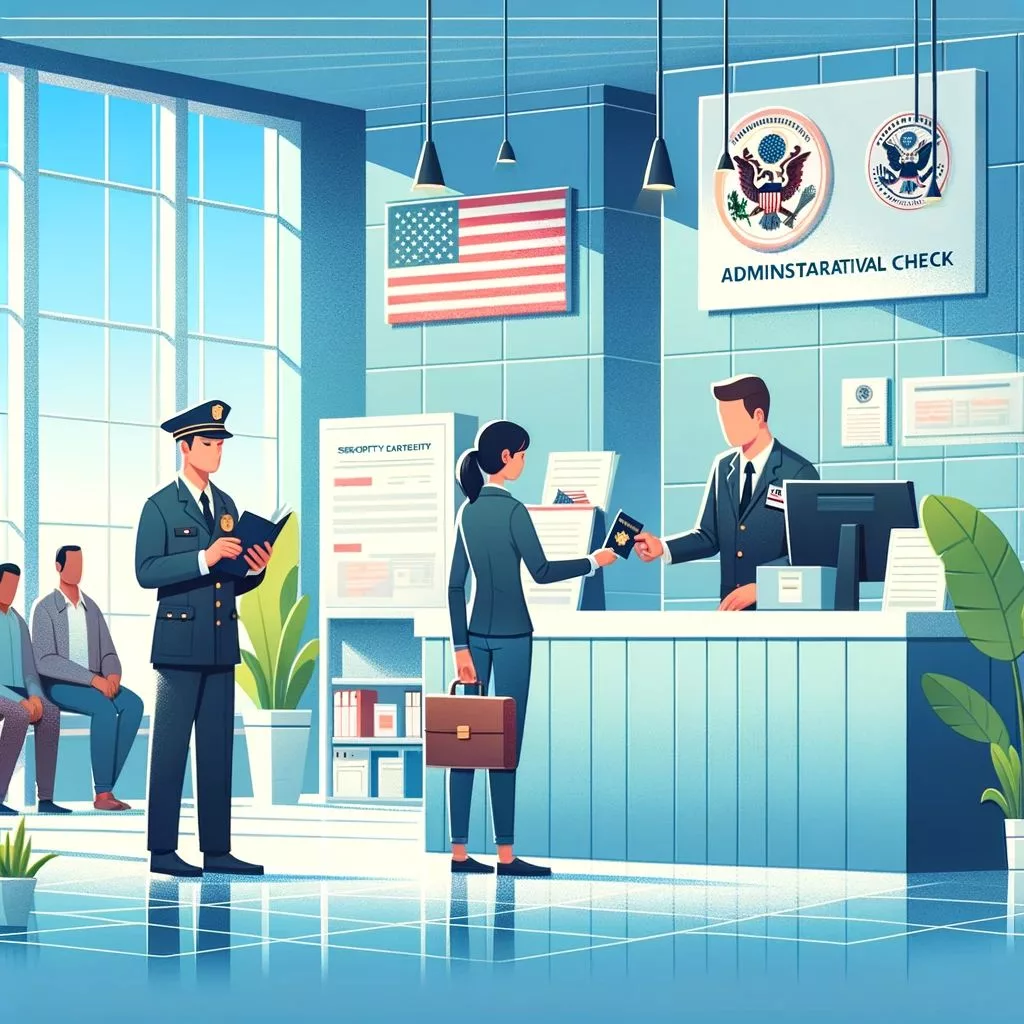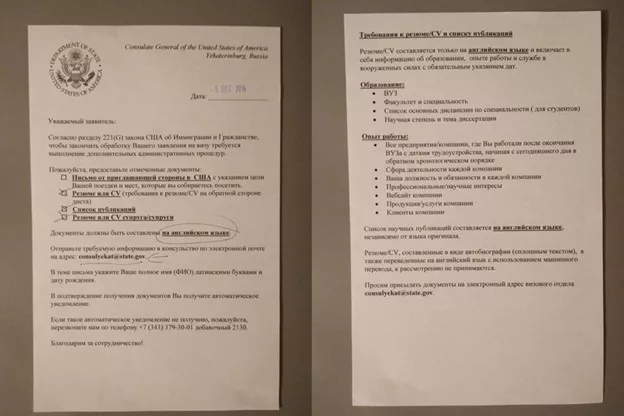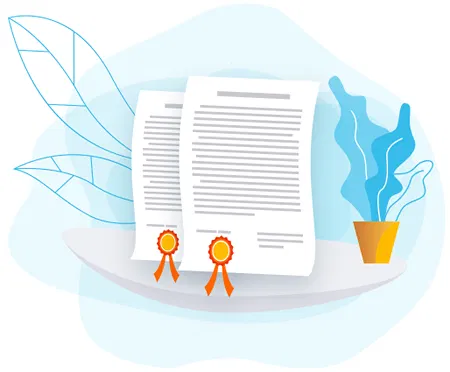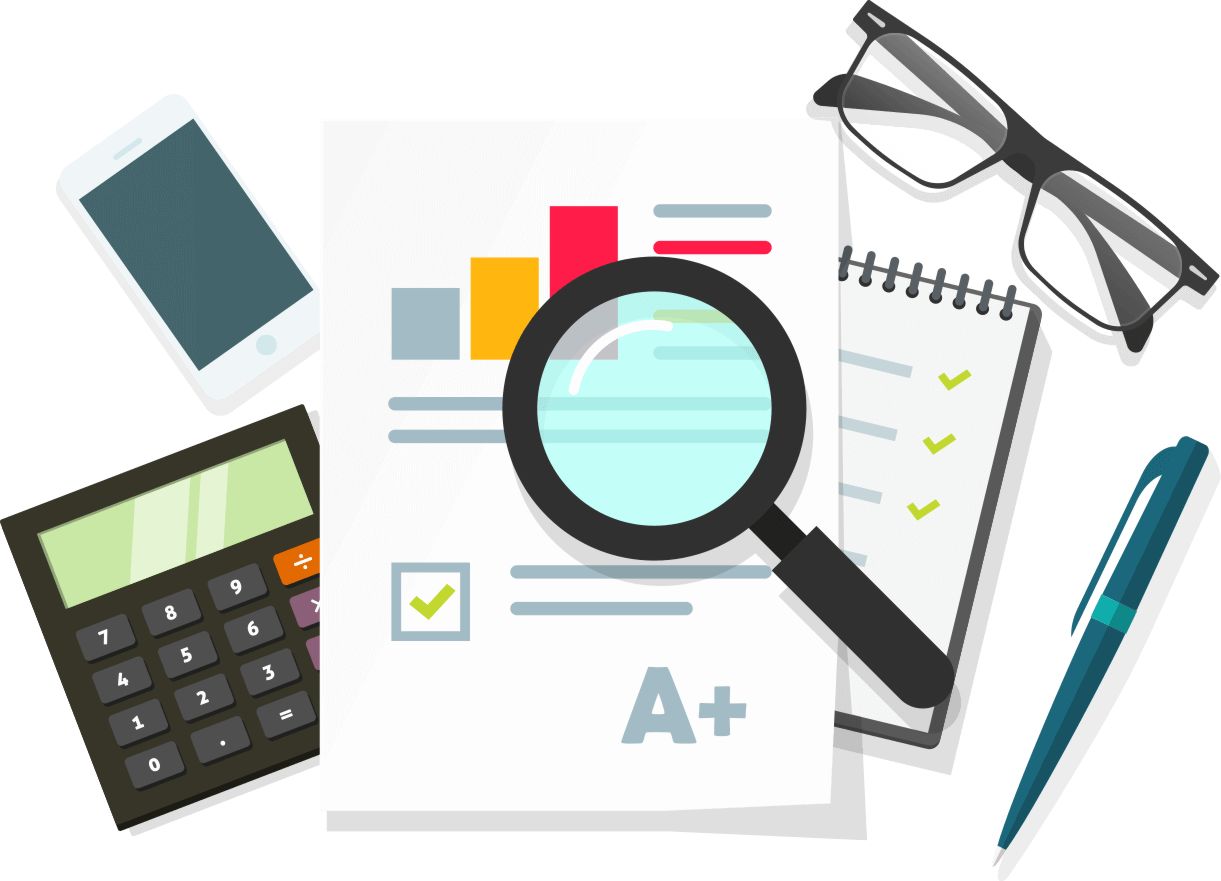Section 221(g) of the Immigration and Nationality Act (INA) is a temporary withholding or denial of a visa application. In order to obtain a visa and enter the United States, an immigrant must pass a visa interview. If the visa application needs additional work or review, it is suspended under Section 221(g). When this happens, the visa application has been approved by U.S. Citizenship and Immigration Services (USCIS), but the consulate is not convinced that the immigrant is eligible for a visa on the day of the interview.
There are several main criteria. As a rule, the main reason is the field of professional activity of the applicant. Most often in the category of “verifiable” include employees of scientific and production enterprises and research institutes, candidates and doctors of science specializing in nuclear/quantum physics, nuclear and electric power engineering, biomedicine, chemistry, materials science. This also includes employees in the military, defense industry and a wide variety of high-tech and scientific development fields.
If the visa officer informs you that an administrative review has been ordered in your case and hands you a one-sheet 221(g) form, this means that you will be required to submit additional documents. Your resume is of particular interest to the U.S. authorities, so you should prepare it in English, including information about your education, degrees, work experience, scientific publications, and areas of research interest.
Your CV should be detailed and describe your activities as much as possible. You can send your CV electronically after the interview (you have 12 months to do this) or bring it with you to the interview and present it to the visa officer. Sometimes proof of your education is also required. In this case, you should prepare a diploma proving that you have graduated from the relevant educational institution.
In general, there are two (2) types of 221(g) cases:
- A Washington, D.C.-related administrative review that requires authorization or approval from the agency or agencies involved in Washington, D.C.
- A post-arrival check when a consular officer needs additional time, information, or documentation before making a final decision on visa issuance.
Washington authorizations are required when an applicant has legal, security, and criminal issues, has concerns about exporting technology from the U.S., has other admissibility issues, or is from a country of concern. Security issues may arise for a visa applicant for a variety of reasons – the applicant may be linked to potential terrorists; the individual may have previously served as a military or other attaché to the U.S. in an unfriendly country; the applicant may have spent time in certain countries (Iran, Syria, etc.); or the applicant may be suspected of criminal activity or connections. These situations may result in lengthy visa processing due to the need for additional investigation. A security advisory opinion is required to address the above issues. Similarly, if the visa applicant is a citizen or national of a particular country (Iran, Syria, Sudan, etc.), he/she must first obtain Washington authorization. It is often the case that obtaining authorization is a mere formality, and for some types of authorizations, the validity of the visa may be limited.
List of specialties for administrative review
Applicants applying for a U.S. visa should be prepared for the possibility of an additional screening appointment. This procedure involves a more detailed review of the case. In addition, consular officers may request additional supporting documents. Not all applicants are subject to this check: in general, this category of applicants is limited to a special list officially adopted by the U.S. Department of State. This is the “Technology Alert List” (Technology Alert List). This document was developed and adopted in November 2000, and then (in 2002) supplemented after the terrorist attack of 11.09.2001. The main purpose of the drafting and practical application of this measure is to prevent the transfer of goods, technology and information – in specially designated areas.
No one can tell you exactly how the review is taking place. The U.S. State Department does not publicize its sources of information and does not disclose all the specifics of the review process. The only thing that is known for sure is that resumes and questionnaires are sent to Washington for detailed examination. At the same time, the procedure of administrative review under the US visa is not divided into any intermediate stages. It is impossible for the applicant to know where and who is currently examining your documents, what exactly they are checking, who they are contacting, what they want to clarify. Even if you write a request through the feedback form in your personal profile or call the Embassy’s hotline, the only response you are likely to receive is: “The case is under review, you will be notified personally when the check is completed.
You can track the status of your documents at the link . The choice of statuses is not rich: there are only three options. Option one – “Ready ” – signals that the documents have been received by the Americans and are waiting to be reviewed. Option two – “Administrative processing ” – indicates that the applicant’s resume is being checked. Option three – “Issued ” – indicates that the procedure has been successfully completed. In this case, the American visa is considered approved, and it will be pasted into the passport. Next, the consular service passes the travel document to delivery, and in a few working days the passport with the visa will be delivered to the specified address. In theory, a “Refused” option is also possible, but you will usually be contacted and invited for a second interview before this happens.
If you do not complete the actions listed in the document received at the U.S. Embassy within 1 year from the date of the 221(g) decision, your case will be canceled.
Statistics
How, who and how AP is conducted is unknown. There are several types of checks (depending on suspicion) – terrorist links, possible industrial espionage, name matching with a criminal, etc. Information on the types of AP can be found here (also called security advisory opinion):
https://en.wikipedia.org/wiki/Security_Advisory_Opinion
As you can see, according to somewhat outdated information (2004):
– 87% of cases are resolved in 30 days or less;
– the other 5% is 31-60 days;
– another 5% take 61-90 days;
– another 1% at 91-120 days;
– another 2% for more than 120 days.
Note the wording – “more than 120 days”. There are people who have been waiting for YEARS!
There are no official statistics, but there is a Chinese website
where people leave information about their experiences.
Security Advisory Opinion (SAO)
There are two main types of checks: background and security checks and administrative processing.
Such a procedure as background and security check cannot be avoided. It can be very superficial – a person is run through databases, looking for errors in documents, and if nothing is found, the check is over.
And there are more in-depth checks, administrative processing. When they call relatives, employers, write letters to banks and registry offices. Very often this happens because the consular officer did not like something in the applicant’s application form.
A separate subset of administrative screening is the Security Advisory Opinion (SAO). This is an in-depth screening of people who may pose a risk to the United States.
There are several categories of applicants who always go through the SAO:
- scientists (physicists, chemists, biologists, and so on) who could potentially work as spies in the U.S. and transfer classified technology to the homeland or other countries;
- employees of a foreign government;
- people whose names match the names of known criminals. There may be problems if your surname is Basayev and your name is Shamil;
- residents of Cuba, China, Iran, Russia;
- suspected terrorists;
- military;
- those who are on Interpol or other watch lists.
Technology Alert List
There is a Technology Alert List (abbreviated as TAL). This is a list of professions that are subject to special scrutiny by U.S. intelligence agencies when applying for a visa to the United States.
That is, if your profession has anything to do with this list, there’s a good chance you’re facing an additional check.
Inspection statistics and case histories
If very briefly, the administrative check threatens residents of Russia, China, India, Israel, Pakistan; as well as scientists (especially physicists, chemists, biotechnologists), programmers (especially electronic programmers), material scientists, aircraft and marine designers and those who somehow or other crossed with the state defense or military (/secondary) technologies (including specialization in the diploma). Usually from additional documents require a resume (in the manner of American CV, plus a detailed description of their work, their tasks, as well as contacts of organizations, and those to whom the GC is sent in the U.S., who gives you a Letter of Support) and a list of scientific papers (again, if there are any), plus may ask to fill out a questionnaire with questions such as do not work for the defense industry, do not sponsor terrorism, etc. The check lasts from 2 weeks to a month. Sometimes longer, sometimes much longer.
MORE FAQ
What is an administrative review?
Administrative Check 2 (aka Name-Check, administrative processing, Security Advisory Opinion (SAO), Visas Mantis, Washington Special Clearance, administrative clearance) (thanks blackmouse 1) is the process of deciding whether to grant (or deny) a visa to an applicant, involving a review of the applicant’s case by the U.S. Department of State (and many different U.S. government agencies). The administrative review is conducted at the request of the consul. The consul will make the request if there are grounds for such a review (see below for those grounds).
What is the purpose of doing this?
The purpose is to:
a) prevent possible attempts to illegally gain access to state secrets and/or export technologies (related to U.S. security), including nuclear, nano, sophisticated electronic technologies (see TAL for a list of technologies below);
b) prevent facilitation of terrorism and countries that sponsor terrorism.
How long does the admin review last?
An admin check can last from 14 days to… infinity. But the usual (most common) admin check period is from 2 weeks to a month. From the wiki, more detailed statistics for 2003 are as follows:
87% of Visas Mantis cases (one of the various kinds of SAOs) has been cleared in 30 days or less, 5% were taking 31-60 days, 5% were taking 61-90 days, 1% were taking 91-120 days and the final 2% were taking more than 120 days
Will I have an administrative review?
First of all, if you are from Russia/China/India/Israel/Pakistan, you will have a higher chance of an admin check than others. Since these countries are on the list of countries that have signed the nuclear non-proliferation treaty (which is the reason for the additional check).
Also, if you suddenly have anything to do with countries on the bad list (Cuba, Libya, Iran, Iraq, North Korea, Sudan, Syria), you’re also very likely to get an admin check.
Secondly, it is worth checking whether your specialty (by diploma, by actual work) belongs to the Technology Alert List (TAL):
- “technology alert list 2012”:
- Conventional Munitions (ammunition, directly armed);
- Nuclear Technology, Physics, and Engineering;
- Rocket Systems and Unmanned Air Vehicle;
- Navigation, Space Technology, Avionics and Flight Control;
- Chemical, Biotechnology and Biomedical Engineering;
- Remote Sensing, Imaging and Reconnaissance (GIS, Imaging and Reconnaissance systems);
- Advanced Computer/Microelectronic Technology;
- Materials Technology;
- Information Security (Information Security);
- Laser and Directed Energy Systems Technology(?) );
- Sensors and Sensor Technology (radar, sensor, sensor, eavesdropping, sensing, etc.);
- Marine Technology (marine technology, including sonar and marine exploration technology); and
- Robotics Urban Planning; in general, this includes robotics itself and artificial intelligence systems.
Is at least one of the organizations you have dealt with related to the military industry, defense industry, or the same TAL list. Whether the organization is not a subsidiary/supplier of any state-owned technology concern (for Russia, it is like Rostechnologii, Rosnano, Rosatom, etc.).
One more factor of admin check (but already disputable) can be changes (changed job, went to study somewhere) you made between sending forms to KCC and the interview. But this point is most likely controversial and may not play a role. Also various inaccuracies in the documents, mismatches in the names of jobs, any semantic inconsistencies in the documents can cause admin-check.
If I fall into the above cases, can I be denied a visa?
Probably not. Admin verification is overwhelmingly completed positively in the vast majority of cases. Denial may threaten rather those who are really somehow involved in serious (threatening the security of the USA), perhaps even classified research (more likely even to the real threat of the possibility of illegal export of technology, technological espionage). Or those who really had something to do with terrorism.
What do I need to prepare in advance in case of an inspection?
General recommendation: make sure you have your case number and your basic contact information (phio, date of birth, mail(?) ) on all sheets.
More often than not, a CV (similar to an American CV, plus a detailed description of your work, your tasks, and organization contacts) may be required. You should pay careful attention to the fidelity of the contacts. In general, it is recommended to write specifically, with all the necessary detailed information, avoid vague phrases about your activities. Plus there were cases 3, when even the GC delivery address (address in the U.S.) played a role. Therefore, it also makes sense to specify the contacts of those people who will receive GC in the U.S., and those people who give you Affdavit of Support or Letter of Support (if given). Of course, you should specify who these people are and who they are to you.
Those who have scientific publications should prepare a list of scientific papers (in English), preferably including all necessary bibliographic output data.
Also at the consulate they can give you a questionnaire with a list of questions (thanks to c0dekhan 6):
“Primary purpose of your trip (research or study)?”
“Will you have access to U.S. Army or other classified government projects?”
“Do you intend to return to work in a country that sponsors or is a supporter of terrorism?”
“Do you have ties to an organization that has been sanctioned by the U.S. or is a supporter?”
(source 1)
There are also sometimes exotic requests of the consul:
a) may ask for a list of grades for the period of study in a higher education institution;
b) may ask for a form 157(alittle about this 7, or search the forum for “form 157”)
c) there was a particularly rare strange case when they asked for a photo from university life (see the link at the bottom of the thread “3 VISAS IN QUESTION????”). And it was requested very late, after 5 months of verification. But this is the only case in fact.
How do I affect the timing of the inspection?
In general, the duration of the process will not be directly affected, as it is the work of the U.S. State Department, but there are several recommendations, as you can try to indirectly increase the chances of passing the check quickly and without much delay:
It is important to accurately list contacts of organizations (where one has worked, perhaps even universities and schools, but the last two points are debatable) and individuals (including the recipient of the GC in the U.S. as well as the giver of the Affidavit of Support and Letter of Support).
It is important that there is no confusion or contradictory information in the documents (including the CV). There should be no vague phrases that are misleading.
It is important to bring the missing documents as soon as possible after the interview and be sure to ask if any additional information is needed (ask: if you need a resume, list of works, contacts of organizations, etc.). Because the administrative check itself will not start until all documents (and all required information) have been received.
After the 60 days and 90 days have passed (if it has gotten to that point), you can start questioning (including phone calls) the consulate in detail about the status of the case. Up to this period, you can limit yourself to letters only. But in the period from 60-90 days, the consulate may send a request to the U.S. about the status of the check, so you need to shake them up, ask them on the phone.
In general, from the third month onwards, it is mandatory to regularly check the status of the check by post. This may be important also because when the check is completed and the consulate receives the decision (often positive), sometimes this moment is missed and the applicant is not informed immediately that the check has been completed (there were cases when the notification of the end of the check came immediately after the applicant’s request). At a minimum, it is worthwhile to check in once a month. It is possible to do it twice.
One more thing. There is a procedure of accelerated administrative inspection. But this requires the consul to make an appropriate note stating the essential reason for such acceleration (often it is for health reasons, which is more related to non-immigrant visas than to DV).
How do I find out the current status of admin check?
You will not get much information. Basically, you can only find out whether the inspection has been completed or not yet.
You can do this through sending an email (thanks SlavaKe 1). Basically this check of your passport verification status:
To: passportstatus@ustraveldocs.com
Subject: 7xx39xx17 (passport series and number without space)
Email body: (leave blank)
According to this algorithm, it came to us all the time,
Please use a valid passport number or UID.
and today
The current status of your passport is In Transit From Post.
The response should come back with an automatic phrase saying that the case is still under verification (either that use the UID) or that the passport has been sent to you (if the verification has passed).
Call/email your consulate. Ask if the administrative check has been completed (it is recommended to write in English).
There’s also a way to call the US State Department directly (thanks Ellie 1)
When we were waiting for visas we called this phone number:+12026631225. This is the DOS phone number in the USA. They immediately look at the computer and tell you what the status of the case is. It is unlikely to speed things up, but it can brighten up the wait.
Calling or writing to the U.S. State Department is a last resort. Such a step can be taken in the 5th or 6th month of the admin review. Or when there is not much time left before the end of the fiscal year (e.g. August-September). But again, even such calls do not mean that the process will be accelerated.
If I have already had an admin check (on another visa), will they check again?
It is very difficult to predict. If the admin check was in the same year as the upcoming interview, and if nothing has changed since then (same job, studies), then there is a chance that the admin check will not be repeated. But if there have been changes, they will probably do it again.
///
In fact, there are many admin checks for various reasons – from problems with the docks, some errors in the forms, not docking, misleading the embassy staff to technical specialty.
I will mainly talk about technical specialties, as I myself was tested because of it. There is a certain list, the latest version of which is generally unavailable, I have seen only the years before last, and it lists roughly all technical and scientific specialties from nuclear engineering, robotics, to even architecture, including physics, biology and so on. If the consul hears or sees in your forms at least one word from this list – the admin check is guaranteed, as they are obliged to check you for export control. This check is called Visas Mantis check, more details there is an article on wikipedia http://en.wikipedia.org/wiki/Security_Advisory_Opinion
So, they take your job description, a list of your publications, CV in English and Russian languages. At least that’s what they took from me. And they send it back to the states to be checked by the FBI, after the knowledgeable people in black there read it and give the okay, it all safely comes back to the embassy and then they send you a visa.
Advice – if you are working with something serious or that do not write everything in detail, because it can play a cruel joke with you both in terms of the U.S. and Russia (I do not know how it is with other countries).
You can put this text if you want on the forum for general information, so that people like me in my time not to scour the Internet in search of some information. Gud lak!


ADDRESSES:
FAQ
- https://forum.awd.ru/viewtopic.php?f=326&t=98472&attempt=1
- https://shepelskylaw.com/административная-проверка-означает/?lang=ru
Technology Alert List
- List of Critical Technologies in English for February 2024
- List of Critical Technologies in Russian for February 2024
- https://en.wikipedia.org/wiki/Technology_Alert_List
Security Advisory Opinion
- https://en.wikipedia.org/wiki/Security_Advisory_Opinion
- https://dev.abcdef.wiki/wiki/Security_Advisory_Opinion
Security Advisory Opinion Sheet
VIDEO



